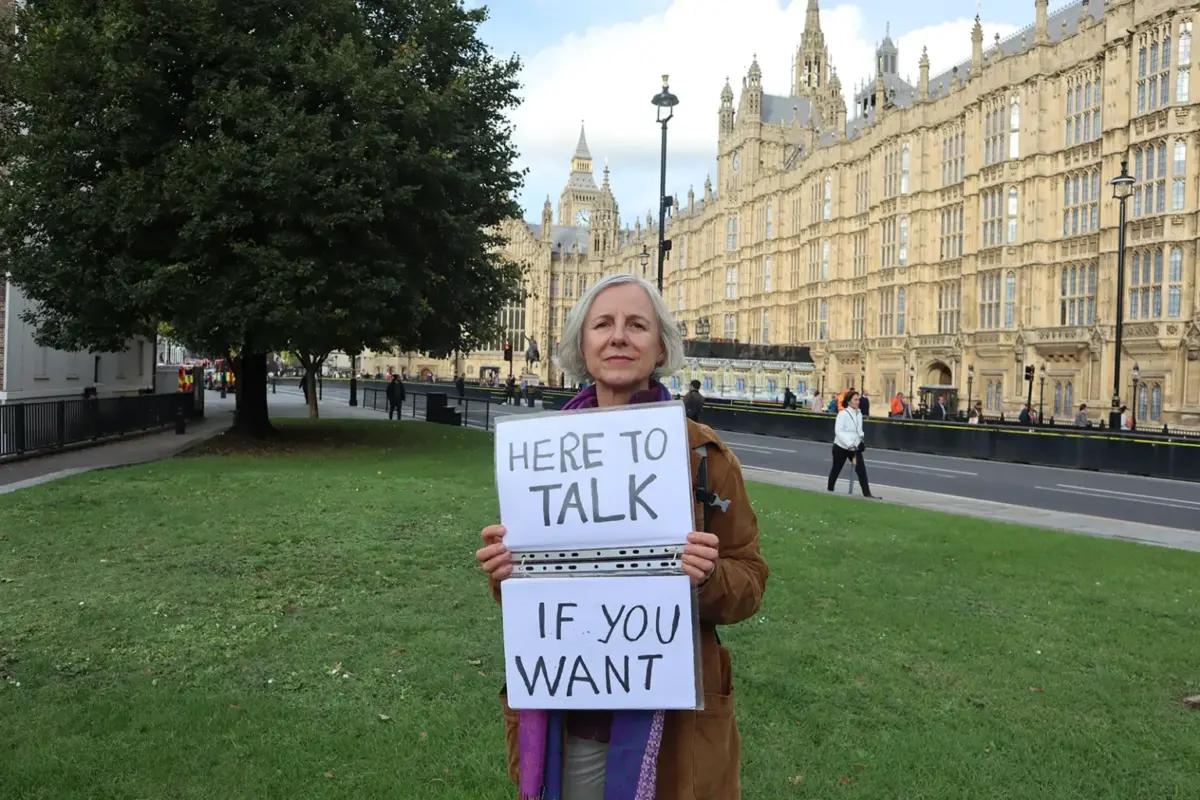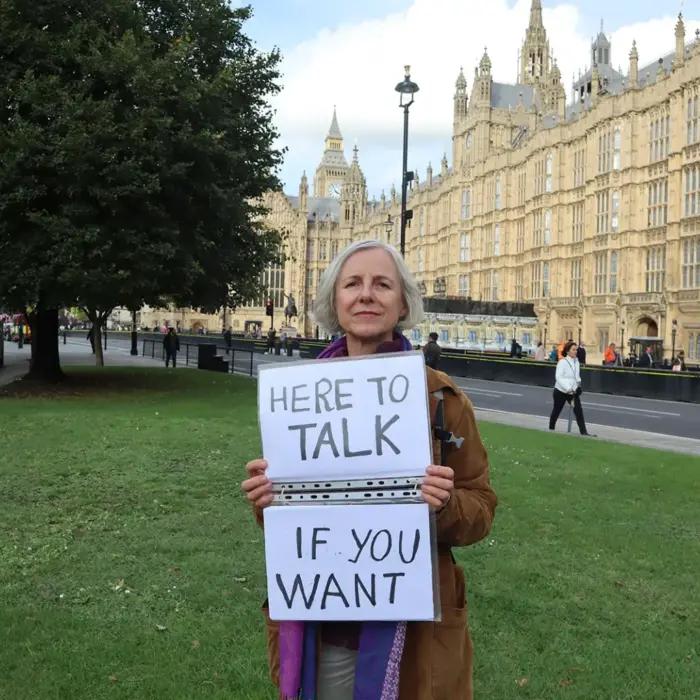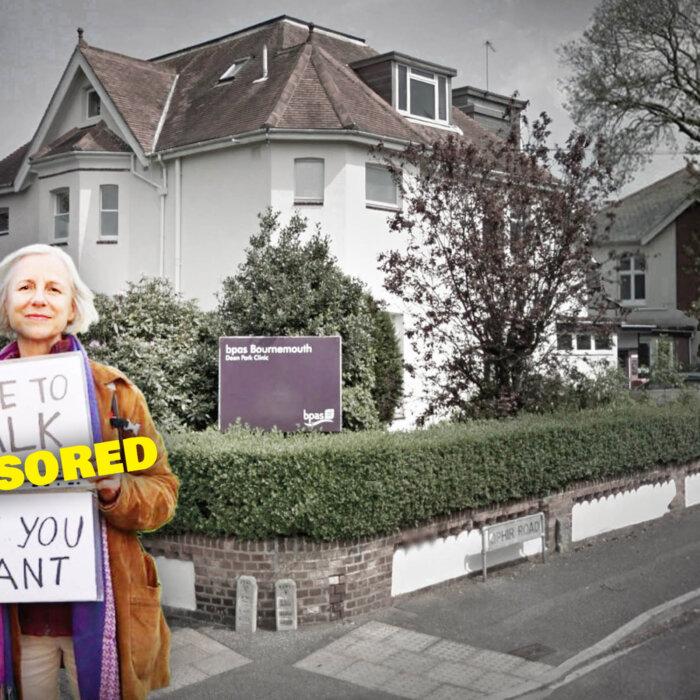A woman at the centre of a transatlantic free speech row has been found guilty of breaching a buffer zone outside an abortion clinic in Dorset.
Livia Tossici-Bolt, 64, was convicted on Friday at Poole Magistrates’ Court of two counts of violating a Public Spaces Protection Order (PSPO) near a clinic in Bournemouth, southern England, in March 2023.
The retired medical scientist, who lives in Bournemouth, was accused of holding a sign that read “Here to talk, if you want” within the 150-metre buffer zone.
Normally used for substance abuse and criminality issues, PSPOs create buffer zones, which enable local authorities to prevent certain anti-social activities from taking place in an area. They have been used to enforce zones around abortion clinics, making it illegal to intentionally or recklessly influence anyone’s decision to access abortion services within 150 metres of a clinic.
District Judge Orla Austin said Tossici-Bolt showed a “lack of insight” into the potential impact her presence could have on those attending the clinic.
“I accept her beliefs were truly held beliefs. Although it’s accepted this defendant held pro-life views, it’s important to note this case is not about the rights and wrongs about abortion but about whether the defendant was in breach of the PSPO,” the judge added.
She said that the buffer zone constituted “a small area that it is necessary to protect the rights of those using and/or visiting the clinic.”
She concluded that a conviction did not constitute a disproportionate interference with the defendant’s rights under Article 10 of the European Convention on Human Rights, which protects freedom of expression.
Bournemouth, Christchurch and Poole Council welcomed the conviction, emphasising that the buffer zone was designed to ensure patients and staff could access the clinic “safely” and “without fear of intimidation.”
“We will continue to monitor any reported breaches of this PSPO and will take appropriate action where necessary,” a council spokesperson said.
Defence counsel Rosalind Comyn argued there was no evidence that Tossici-Bolt’s presence had caused distress or harm to anyone attending the clinic.
“The council has not presented any evidence that Tossici-Bolt was observed by any service user, or that her conduct resulted in any harm. My point is not that breaches can never cause harm, but rather that there is no indication of harm in this particular case,” she said.
International Spotlight
The case has attracted international attention after the U.S. Department of State’s Bureau of Democracy, Human Rights, and Labour (DRL) posted on social media that it was “monitoring” the proceedings.“We are monitoring her case. It is important that the UK respect and protect freedom of expression,” the post said.
The issue of free speech was raised by U.S. Vice President JD Vance during a recent press conference in Washington with Prime Minister Sir Keir Starmer.
Vance expressed concern over “infringements on free speech” in the UK. In response, Starmer said, “We have had free speech for a very long time in the United Kingdom, and it will last for a very, very long time.”
Vance has previously highlighted the Tossici-Bolt case and that of Adam Smith-Connor, a U.S. citizen convicted for silent prayer in a similar buffer zone, as examples of a “backslide away from conscience rights.”

UK Government Response
Despite the public comments, the UK government has denied that concerns raised by the United States. have influenced the ongoing trade deal discussions.“It’s not been part of the trade negotiations that I’ve been part of,” Business Secretary Jonathan Reynolds told Times Radio.
He added that free speech had not been a “material factor” and that the comments had come from the U.S. State Department, not the Commerce Department, which leads on trade.
Campaigner Response
Speaking through her legal team at Alliance Defending Freedom (ADF), Tossici-Bolt has previously said she was being “dragged through court merely for offering consensual conversation.”“It is tragic to see that the increase of censorship in this country has made the U.S. feel it has to remind us of our shared values and basic civil liberties,” she added.
Lorcan Price, legal counsel for ADF International, argued that Tossici-Bolt’s criminal prosecution highlights a “major point of contention between the US and UK.”
The British Pregnancy Advisory Service (BPAS) stated that the case was “never about global politics,” but rather about “the simple ability of women to access legal healthcare free from harassment.”
BPAS Chief Executive Heidi Stewart said the Bournemouth clinic had endured years of anti-abortion protests, resulting in over 500 reports of harassment prior to the implementation of the local safe access zone.
“It is up to the police and judicial system to determine whether individuals have broken the law. I, meanwhile, stand shoulder to shoulder with our staff, who work tirelessly to protect our patients from the impact of anti-abortion harassment outside the clinic gate,” she said.
A separate case in Scotland earlier this year saw a 74-year-old woman arrested in Glasgow after holding a sign outside a clinic that read, “Coercion is a crime, here to talk, only if you want.”







